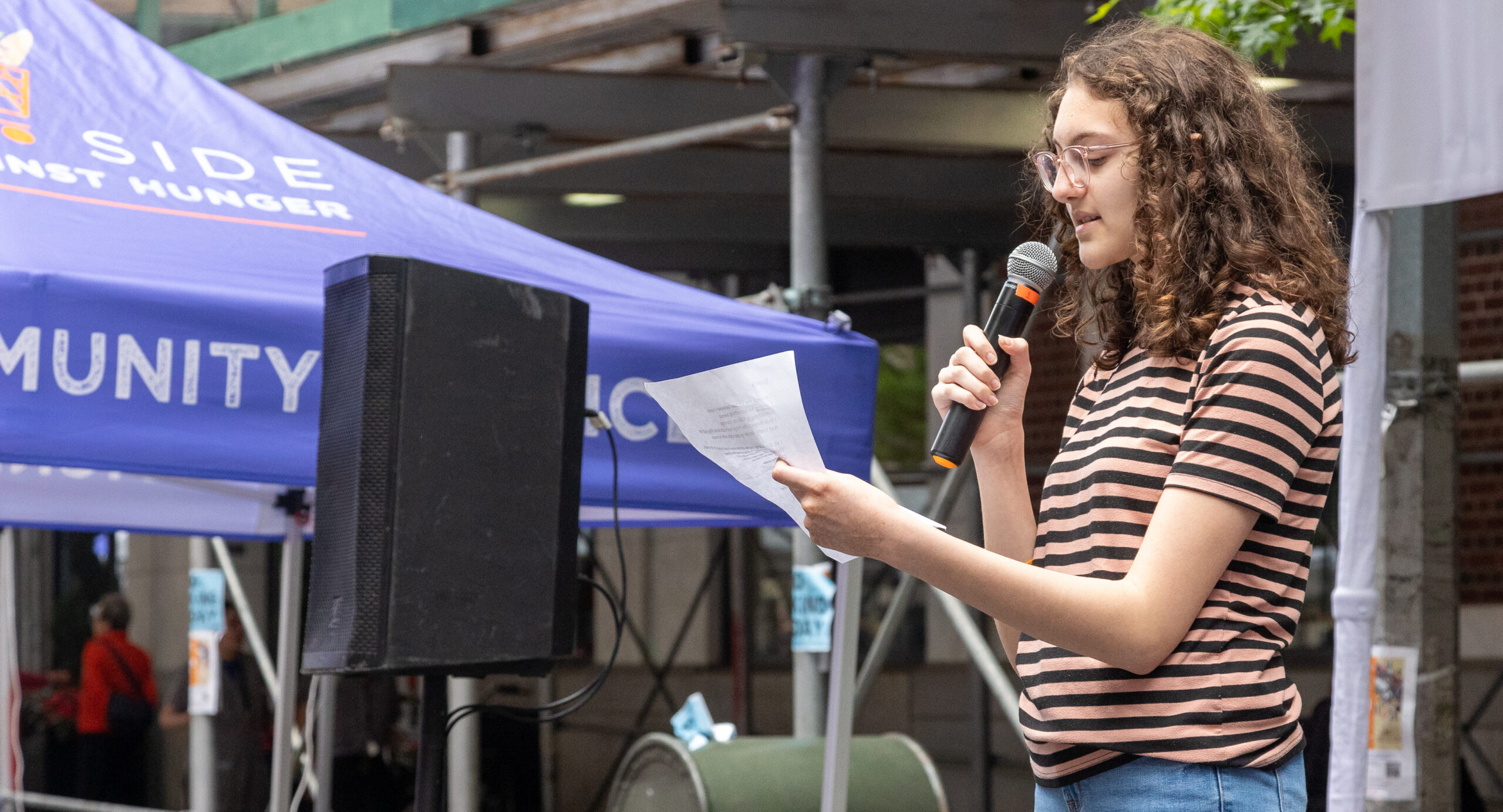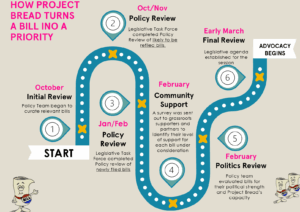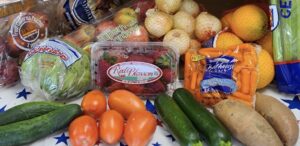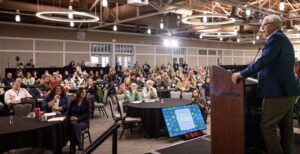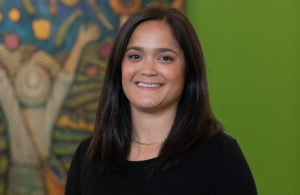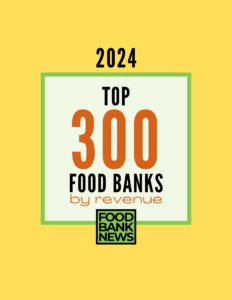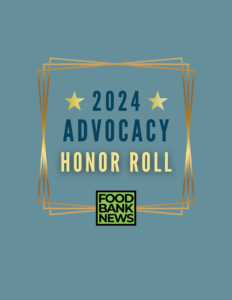At first glance, there does not seem to be a lot of connection between food insecurity and poetry.
Food insecurity is a practical problem that demands practical solutions, be they charitable food distributions or funding from state and federal governments. Within that paradigm, the role of poetry may not be immediately clear.
However, that has not stopped poets across the United States from lending their artistic talents to the fight against food insecurity. Their work is having an impact, and hunger relief organizations are taking notice.
Hiram Larew is the founder of the informal initiative Poetry X Hunger, a group that collects hunger-themed poems from around the world that charitable organizations can use for free in ad campaigns, or other outreach endeavors, so long as they credit the poet.
To him, poetry is an often overlooked tool that can be used to combat food insecurity.
“To try to solve hunger, we need all the data, we need all the statistics, and we need all the trend lines about hunger in order to understand what we’re dealing with,” he said. “But if we don’t bring the arts to bear, and, in my case specifically, poetry to bear, we are missing key tools in the toolkit because, I’m sorry, data, statistics and trend lines simply don’t grab people by the heart. And poetry and other arts, I think, can. So it’s not an either or. We need all of the tools in the toolkits.”
Larew spent most of his life working for the USDA as the Director of International Programs at the National Institute of Food and Agriculture until his retirement in 2015. He is also a poet, whose work has appeared in various journals and in four published collections. It was not until later in his life that he saw the value in putting his two careers together.
Larew feels that poetry has a way of penetrating the hearts and minds of people where other means would not. He believes that the arts can help convince important people that the human impact of hunger demands their attention.
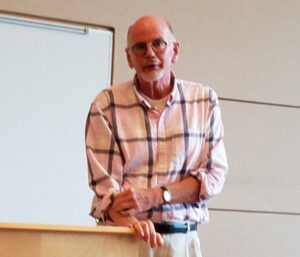
“I’ve seen poems being presented by young people in front of decision makers, policy wonks, congressional folks, senators and representatives,” he said. “Before the poem was presented, people were kind of chatting or looking at their cell phones, and once the poem started to be presented, they looked up, put their pens or handhelds down and really paid attention. It can provide a road into people’s spirits about the issue.”
Poetry X Hunger partners with food banks to provide them with a poet-in-residence. This poet will spend some time learning about food bank operations and seeing anti-hunger work firsthand. Then, they will write a poem for the food bank to use. In some cases, the poet may perform the poem they wrote at fundraisers for the organization.
Aaron Whitehead, a poet based in Alexandria, Virginia, was the first poet-in-residence provided by Poetry X Hunger to a food bank. He visited with Washington D.C. based Capital Area Food Bank and saw what they did up close. Using his experience there, he wrote a poem that, paired with accompanying video, is featured on the organization’s website.
Whitehead feels that, since Amanda Gorman performed at President Biden’s inauguration in 2021, poetry has been elevated in the public consciousness in a way that it has not before. He feels that hunger issues should be elevated in the same way.
“People are wanting to do poetry more. You’re starting to see more poets, more people writing more,” he said. “I think the same thing with hunger. It’s like this shouldn’t be a secret anymore, you know? It should be something that’s on a national stage.”
He feels that poetry can be used to draw attention to aspects of the fight against hunger that the average person does not know about or understand.
“I don’t necessarily think everybody knows what Capital Area Food Bank completely does. And you know, maybe if they did, it would change some things. And I think that’s where the intersection can be,” he said. “Poetry can bring this lack of awareness to more awareness. Because poetry doesn’t have to be hunger in a box. You can go to open mic nights and say something about hunger in a poetic way, and that could change something.”
Poetry X Hunger is not the only organization that has become aware of the value poetry can have in the fight against hunger.
West Side Campaign Against Hunger (WSCAH) is a large New York City-based food pantry. In 2022, it started running an annual community block party known as WSCAH Rocks the Block, where people from the communities they serve can enjoy a variety of activities and eat food from local businesses.
For its second annual Rock the Block, WSCAH held a poetry contest for students from local schools to enter. All of the submitted poems had to be about hunger or food, and contest winners had the opportunity to perform their work at the event. In the end, WSCAH named nine winners and nine finalists, and posted their poems on its website.
According to Kira Garfinkel, Development Manager at WSCAH, the contest was a way for their organization to involve students in the area in a conversation about food insecurity.
“Going into year two, we were like, ‘We’d really like to include our school community,’” they said. “We have a lot of schools who partner with a lot of students who are interested in and concerned about hunger in New York City and across the world and wanted to create another opportunity for them to get engaged.”
The poetry contest gave WSCAH a way to engage its community in a new and constructive way. “Some students clearly took this as an opportunity to also consider and think about what it’s like to be living in a time and in a city and in a country where there are intense and difficult inequalities,” they said.
WSCAH intends to keep the writing contest for future iterations of the Rock the Block event and expand it even further, Garfinkel said.
Now that poetry has established a foothold in the conversation around hunger, the possibilities of where it can go are endless. Larew of Poetry X Hunger feels that poetry should have a place in other aspects of solving the food insecurity crisis, such as agriculture.
“My entire career, I never heard any of the arts, certainly not poetry, being brought into the discussion about how you raise livestock. Nothing,” he said. “So for me, that’s a blank canvas. That’s a real opportunity, but it is a challenge as well.” – Nicolas Magrino
Nicolas Magrino is a graduate student at the Craig Newmark Graduate School of Journalism at CUNY and a summer intern at Food Bank News.
CAPTION FOR PHOTO ABOVE: Sidney Meyer reads her winning poem, Snack, at West Side Campaign Against Hunger’s Rock the Block event.
Like what you’re reading?
Support Food Bank News
